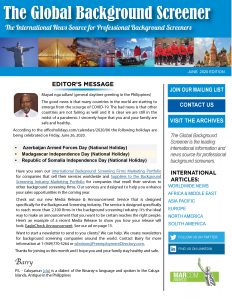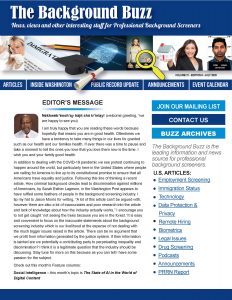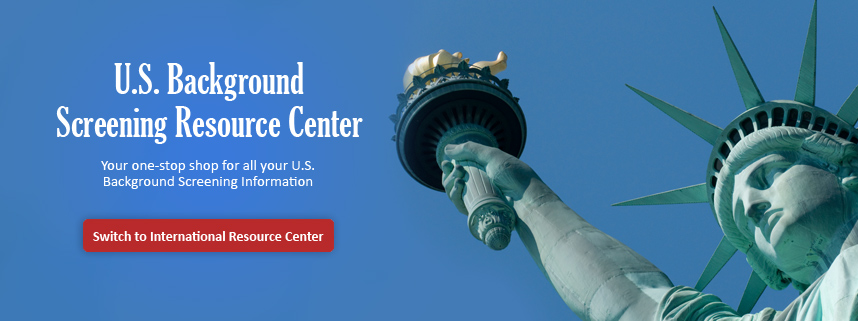U.S. Background Screening Companies:
U.S. Background Screening – Privacy and Data Protection Laws:
![]()
U.S. Background Screening – Laws by State in the USA
Here are public records in each state.
Click your corresponding state below and learn more about your specific situation.
- Alabama
- Alaska
- Arizona
- Arkansas
- California
- Colorado
- Connecticut
- Delaware
- Florida
- Georgia
- Hawaii
- Idaho
- Illinois
- Indiana
- Iowa
- Kansas
- Kentucky
- Louisiana
- Maine
- Maryland
- Massachusetts
- Michigan
- Minnesota
- Mississippi
- Missouri
- Montana
- Nebraska
- Nevada
- New Hampshire
- New Jersey
- New Mexico
- New York
- North Carolina
- North Dakota
- Ohio
- Oklahoma
- Oregon
- Pennsylvania
- Rhode Island
- South Carolina
- South Dakota
- Tennessee
- Texas
- Utah
- Vermont
- Virginia
- Washington
- West Virginia
- Wisconsin
- Wyoming
- Montana
- Nebraska
- Nevada
- New Hampshire
- New Jersey
- New Mexico
- New York
- North Carolina
- North Dakota
- Ohio
- Oklahoma
- Oregon
- Pennsylvania
- Rhode Island
- South Carolina
- South Dakota
- Tennessee
- Texas
- Utah
- Vermont
- Virginia
- Washington
- West Virginia
- Wisconsin
- Wyoming
Source: Background Hawk
 U.S. Background Screening – Education Verification Sources and Methods:
U.S. Background Screening – Education Verification Sources and Methods:
U.S. Network for Education Information for:
- International Students and Professionals, information and links about coming to the United States, recognition of foreign qualifications, accredited U.S. institutions and programs, avoiding frauds, and financial aid.
- International Educators and Officials, information about the U.S. education system, U.S. accreditation and quality assurance, recognized institutions, avoiding fraudulent providers, and related resources.
- U.S. Students, information about studying abroad, financial aid, and links to official information about education in other countries.
- U.S. Educators, information about international education, other education systems, teaching overseas and the recognition of foreign education within the United States.
U.S. Human Resources Professionals and Officials, information about foreign education systems, recognized foreign institutions, and U.S. credential evaluation for foreign degree-holders.
Summary of U.S. Federal Government Investigative Findings of Diploma Mills
![]()
U.S. Background Screening – Criminal Background Screening Requirements and Practices:
Criminal Background Checks for Home Care Workers
Ex-Offender Employment Opportunities
NRMA (National Retail Mutual Association) retail theft database allows retailers to legally share information regarding incidents of theft in their stores. With only 5% of the records in NRMA ever being prosecuted, the vast majority of data in the NRMA retail theft database cannot be found anywhere else. All member retailers that use the database are also contributors to the database. All data is based on actual theft (i.e. no theft of time, breaking company policy, etc.). The NRMA retail theft database is a product of GIS (General Information Services, Inc.).
Disclosure of Criminal Records in Oversees Jurisdictions, Page 100
![]()
U.S. Background Screening – Criminal Justice System:
![]()
U.S. Background Screening – Tribal Court System:
National Survey of Tribal Court Systems (NSTCS)
As displayed in report, 2014.
Data Experts
Steven W. Perry, BJS Statistician
Michael B. Field, BJS Statistician
Collection Period – 2014
Description
The legal institutions in Indian country revolve around four main entities: indigenous or traditional courts, general jurisdiction courts, appellate courts, and the Bureau of Indian Affair’s Code of Federal Regulation courts. The National Survey of Tribal Court Systems (NSTCS) is the first complete enumeration of tribal court systems operating in the United States and gathers administrative and operational information from tribal court systems, prosecutors’ offices, and indigent defense providers operating in the United States. The NSTCS helps fulfill BJS’s legislative mandate under the Tribal Law and Order Act of 2010 (TLOA; P.L. 111-211, 124 Stat. 2258 § 251(b)) to establish and implement a tribal crime data collection system.
Methodology
Questionnaires
Publications and Products
Tribal Courts in the United States, 2014 – Statistical Tables
Date Published – July 2021
Tribal Courts in the United States
Tribal Crime Data Collection Activities, 2021
Date Published – July 2021
Tribal Crime Data Collection Activities
https://bjs.ojp.gov/data-collection/national-survey-tribal-court-systems-nstcs#publications-0
U.S. Background Screening – Immigration Information:
The American Council on International Personnel (ACIP) is a leading voice and resource for employers working worldwide to advance employment-based immigration of highly educated professionals.
![]()
U.S. Background Screening – Credit Check Laws and Requirements:
Use of Credit Information in Employment 2012 Legislation
To date, 39 bills in 20 states and the District of Columbia have been introduced or are pending in the 2012 legislative session. Out of the total 39 bills, 38 address restrictions on the use of credit information in employment decisions. The total number of states that limit employers’ use of credit information in employment is now seven: California, Connecticut, Hawaii, Illinois, Maryland, Oregon and Washington.
![]()
U.S. Background Screening – Drug Testing:
State by State Law
Drug & Alcohol Testing Industry Association (DATIA)
Substance Abuse Program Administrators Association (SAPAA)
U.S. DOT Office of Drug & Alcohol Policy & Compliance
![]()
U.S. Background Screening – Terrorist Information:
Specially Designated Nationals (SDN) and Blocked Persons
16 June 2004, revised 2 May 2005. The U.S. Treasury Department, Office of Foreign Assets Control (OFAC) publishes this list of individuals and companies controlled by targeted countries. The list includes “individuals, groups, and entities, such as terrorists and narcotics traffickers designated under programs that are not country-specific. Collectively, such individuals and companies are called ‘Specially Designated Nationals’ or ‘SDNs.’ Their assets are blocked and U.S. persons are generally prohibited from dealing with them.”
The Excluded Parties List System provides integrated search access to several debarment lists.
List of Parties Debarred for Arms Export Control Act Convictions
21 June 2004. The Directorate of Defense Trade Controls of the U.S. Department of State provides two lists–one statutory and one administrative–of companies and individuals convicted of violations involving the Arms Export Control Act (AECA) or the International Traffic in Arms Regulations (ITAR). Both lists are alphabetical and include a Federal Register citation, although not a link to the relevant issue.
Entity List
16 June 2004, revised 2 May 2005. The U.S. Bureau of Industry and Security (BIS) maintains this list of foreign individuals and companies, which “have been determined to present an unacceptable risk of diversion to developing weapons of mass destruction or the missiles used to deliver those weapons.” Changes to the list appear officially in the Federal Register.
Terrorist Exclusion
OIG & GSA Sanctions Report
The OIG & GSA search utilizes the U.S. Dept. of Health and Human Services and the Office of Inspector General’s database for individuals and businesses excluded or sanctioned from participating in Medicare, Medicaid, or other Federally funded programs. If an organization employs an individual on these sanctioned lists they may be forced to pay back all Federal funds received via these programs going back to the date the person was employed. Therefore, the OIG and GSA search is vital for healthcare industries.
The search is comprised of the following components: OIG (Office of Inspector General), GSA (General Services Administration), FDA (Food and Drug Administration), DEA (Drug Enforcement Agency) and action taken by licensing boards in all 50 states.
![]()
U.S. Background Screening – U.S. Department of State Resources:
Office of Foreign Asset Control (OFAC) of the U.S. Department of the Treasury
The following lists may be relevant to your export or re-export transaction:
Denied Persons List: A list of individuals and entities that have been denied export privileges. Any dealings with a party on this list that would violate the terms of its denial order is prohibited.
Unverified List: A list of parties where BIS has been unable to verify the end use in prior transactions. The presence of a party on this list in a transaction is a “red flag” that should be resolved before proceeding with the transaction.
Debarred List: A list compiled by the State Department of parties who are barred by §127.7 of the International Traffic in Arms Regulations (ITAR) (22 CFR §127.7) from participating directly or indirectly in the export of defense articles, including technical data or in the furnishing of defense services for which a license or approval is required by the ITAR.
Nonproliferation Sanctions: Several lists compiled by the State Department of parties that have been sanctioned under various statutes. The Federal Register notice imposing sanctions on a party states the sanctions that apply to that party. Some of these sanctioned parties are subject to BIS’s license application denial policy described in §744.19 of the EAR (15 CFR §744.19).
![]()
U.S. Background Screening – Vulnerable Population Laws and Sexual Predators Information:
Homeland Security
![]()
U.S. Background Screening – Freedom of Information Law:
What is FOIA?
Freedom of Information Research
![]()
U.S. Background Screening – General Information:
![]()
U.S. Articles >>

SUBSCRIBE TO OUR NEWSLETTERS

The Global Background Screener

The Background Buzz!
(U.S. Background Screening
E-Magazine)








